- Home
- J. D. Rhoades
Hellhound On My Trail
Hellhound On My Trail Read online
Table of Contents
Title Page
Also by J.D. Rhoades
Poem
CHAPTER ONE
CHAPTER TWO
CHAPTER THREE
CHAPTER FOUR
CHAPTER FIVE
CHAPTER SIX
CHAPTER SEVEN
CHAPTER EIGHT
CHAPTER NINE
CHAPTER TEN
CHAPTER ELEVEN
CHAPTER TWELVE
CHAPTER THIRTEEN
CHAPTER FOURTEEN
CHAPTER FIFTEEN
CHAPTER SIXTEEN
CHAPTER SEVENTEEN
CHAPTER EIGHTEEN
CHAPTER NINETEEN
CHAPTER TWENTY
CHAPTER TWENTY-ONE
CHAPTER TWENTY-TWO
CHAPTER TWENTY-THREE
CHAPTER TWENTY-FOUR
CHAPTER TWENTY-FIVE
CHAPTER TWENTY-SIX
CHAPTER TWENTY-SEVEN
CHAPTER TWENTY-EIGHT
CHAPTER TWENTY-NINE
CHAPTER THIRTY
CHAPTER THIRTY-ONE
CHAPTER THIRTY-TWO
CHAPTER THIRTY-THREE
CHAPTER THIRTY-FOUR
CHAPTER THIRTY-FIVE
CHAPTER THIRTY-SIX
CHAPTER THIRTY-SEVEN
CHAPTER THIRTY-EIGHT
CHAPTER THIRTY-NINE
CHAPTER FORTY
CHAPTER FORTY-ONE
CHAPTER FORTY-TWO
CHAPTER FORTY-THREE
CHAPTER FORTY-FOUR
CHAPTER FORTY-FIVE
CHAPTER FORTY-SIX
EPILOGUE
About the Author
Copyright Notice
The Jack Keller series
The Devil’s Right Hand
Good Day in Hell
Safe and Sound
Devils and Dust
Breaking Cover
Broken Shield
Ice Chest
Storm Surge
Gallows Pole
Lawyers, Guns and Money
I got to keep movin’, I got to keep movin’
Blues fallin’ down like hail, blues fallin’ down like hail
And the days keeps on worryin’ me
There’s a hellhound on my trail
Hellhound on my trail…
-Robert Johnson
AS THEY lowered her father’s body into the ground, Kathryn Shea raised her eyes and scanned the crowd who stood silently in the rain, watching. How many are really here to pay their respects, she wondered, and how many to make sure the old bastard’s actually dead?
She created a mental map with a quick glance across the rows of seated dignitaries as she took her seat beneath the funeral home tent. She knew who everyone was, where everyone was sitting, and what that meant. That one, she thought, picking out a face from the mental photograph, is here to be seen. He’ll try to maneuver himself into a photo op with me, the grieving daughter. Not going to happen. That one, she thought, picking another, wants my father’s seat. Also not going to happen.
SHE COULD tell the service was ending by the cadence of the words, without really registering their meaning. She put her hand on the stick-thin arm of her mother sitting next to her, knowing what was to come. The crack of the gunshots sent a shiver through the old woman’s body, and she made a small whimper of fear and dismay. “It’s okay, Mother,” Kathryn murmured. “It’s okay.” Another barked set of orders. Another ripple of gunfire. A louder moan came from the old woman’s throat. Kathryn tightened her grip in warning. God damn it, she raged inwardly. Don’t you dare make a spectacle out of this. Her mother looked down at Kathryn’s fingers digging into the paper-thin skin of her forearm, then back up, her eyes uncertain. A third crack of gunfire. This time the old woman was silent, perhaps unsure of whom or what she should be more afraid of.
Kathryn saw the flag being taken reverently from the coffin and folded just so by a Marine who barely looked old enough to shave. He brought the folded flag to them as they sat beneath the canopy and out of the rain, taking no more notice of the moisture dripping from his dress cap than he would have of a gentle summer sun. He knelt before the old woman, who stared at him, eyes wide and uncomprehending. “On behalf of the President of the United States,” the young man murmured, “the United States Marine Corps, and a grateful nation, please accept this flag as a symbol of our appreciation for your loved one’s honorable and faithful service.” He held the flag out to the old woman, who hesitated, then reached out for it with shaking hands, skin shriveled and barely covering the bones.
“Let me, Mother,” the daughter whispered as she reached out and took the flag. “Thank you,” she said softly to the kneeling Marine. The young man nodded, stood up, saluted, then swiveled as if on brass gimbals and returned to his line. There was a brief moment of confused silence, then the crowd began to murmur and shift in their seats. Finally, a few brave souls rose to their feet, followed gratefully by the rest. The daughter stayed put, but she nodded to the man in the perfectly pressed and starched chauffeur’s uniform standing in the rain a few feet away. He nodded back and advanced under the canopy.
“We’re ready to go, ma’am,” the man said kindly to the old woman in the chair, who was looking around in confusion. She blinked at the familiar face, then smiled, rising on his offered arm. Kathryn turned away, knowing that her mother would be quickly hustled home, cared for, and, most importantly, out of her way. There was work to be done.
She saw a junior Congressman from Iowa sidling toward her, one she’d sorted out before as no use. She maneuvered deftly to put a former White House Chief of Staff now serving as a lobbyist between them.
“Kat,” the former Chief of Staff said to her, taking both of her hands in his and kissing her on the cheek. “We’re so sorry for your loss. Your father was a great man. A great American. And a good friend to me and Margie.”
Such a good friend, you couldn’t keep your hands off his sixteen-year-old daughter’s ass on that “fact-finding trip” to Belize, she thought behind the wall of her perfect smile. “Thank you, Carl,” she said, giving his hands a squeeze before pulling away. “Give my love to Margie. And Cassie, of course.” When Cassie gets out of rehab, she thought. She slid away through the crowd, accepting condolences, hugs, and air-kisses.
Finally, she spotted the man she’d been looking for, leaning against a limo, holding an umbrella over his head. He was thin and gray. His hair was gray, his suit was gray, even his eyes were a washed out gray color. No one seemed to notice him or engage him in conversation; he was a man who seemed to fade into the background even as you were staring straight at him. She worked her way toward him through the crowd of alleged well-wishers. He approached and met her with the umbrella.
“You’re handling the crowd well,” the gray man murmured. His name was Frederick Cordell, and he’d made a career out of being both invaluable and invisible as an adviser to rich and powerful men. He’d made several kings before, never a queen. He looked forward to the challenge.
“Thanks,” Kathryn said. “I don’t suppose you have a drink in that car of yours.”
“I have several drinks in this car of mine.” Cordell opened the door for her. She slid gratefully inside, ignoring the dismayed shouts of “Kathryn!” “Kat!” from the crowd still milling about her father’s graveside. For a moment, she allowed her iron composure to slip, but only to the extent of leaning her head against the tinted glass and closing her eyes. Cordell sat in the seat beside her and watched. His pale eyes never seemed to blink. He made a motion to the driver up front and the limo pulled smoothly away from the curb, the privacy shield rising soundlessly. After a few moments, Kathryn opened her eyes. Cordell handed her the martini he’d been building
from the limo’s compact wet bar.
“Thanks,” she said, taking the glass, then a sip. Her eyes closed again, this time in pleasure. Cordell continued to watch. After a moment, she opened them again. “So,” she said.
“I don’t know,” Cordell interrupted, “if I ever fully expressed to you my admiration for your father.”
“Thank you,” she said. She took another sip, then tipped the glass up and drank deeply.
“He was a great American.”
“He was a ruthless, merciless son of a bitch,” she whispered.
He smiled. “That too.”
“Mmm.” She held out the glass for a refill. “So where are we?”
He opened a folder that had been sitting on the seat next to him. “We’ve got firm commitments from about half the county party chairmen.”
She chewed at a thumbnail, still looking out the window. “Only half?”
“Half is excellent this early in the cycle. We should go ahead and announce. Soon, maybe as early as Monday. While you’ve still got…” He trailed off.
She looked back at him. “While I can still use the sympathy over my father’s death. Go ahead and say it.”
He met her stony gaze without flinching. “We are using ‘carrying on the Shea legacy’ as a campaign theme.”
She looked back out the window at the rain. “I’ll let you know.”
He nodded, clearly deciding to let the matter drop for the moment. After a few seconds, Kathryn spoke again. “It’s too bad Clifton couldn’t be here. Any news on his condition?”
This time it was Cordell’s turn to look out the window.
“What?” she asked.
He turned back to her. “Mr. Trammell,” he said with a cold smile, “is circling the drain.”
“Cliff Trammell,” she said, her voice as icy as his smile, “may not have gotten the recognition my father did, but he’s served his country honorably his entire life. So you could show a little more respect.”
“Yes ma’am,” he said. “Mr. Trammell’s condition continues to deteriorate. He’s not expected to live out the week.”
She snorted. “He’ll surprise you. The man’s tough as oak.”
“Yes ma’am. There is one matter that may be of concern.”
“The son.”
“Yes ma’am. One of Mr. Trammell’s old…I guess you could call him a protégé…met with Trammell at the hospital yesterday. He then went to Trammell’s house, entered, and exited twenty minutes later carrying a briefcase. He then went immediately to Reagan International Airport and took a flight to Phoenix, Arizona. That’s the closest airport to where the son is living.”
“So. Trammell’s decided to try and make contact with the son he abandoned forty-some years ago.”
“It would seem so. My sources tell me that, since his diagnosis, Mr. Trammell’s apparently expressed a great deal of remorse over certain events in his life. Abandoning his son in particular.”
“It’s not that event I’m concerned about,” Kathryn said.
“Ma’am?”
“Do we have any idea what’s in that briefcase?”
“No ma’am.” Cordell paused. “At least I don’t. Do you?”
“I might.” She tapped her fingers against the door handle, lost in thought. “Do you have people on the ground in Arizona?”
“I took that precaution, yes, ma’am.”
“People you trust?”
He nodded.
“I don’t want that suitcase delivered.”
He nodded again. “I didn’t think you would. I’ve already taken steps.”
She arched a perfectly trimmed eyebrow at him.
“Nothing serious,” Cordell assured her. “It’ll look like an everyday mugging of a tourist. They’ll take the briefcase. And the courier’s wallet and watch, just for show. Do you want it brought back to you?”
“Yes,” she said. “Unopened. Is that clear?”
“Yes, ma’am,” he said.
“I mean it.”
“It won’t be opened except by you. But…” He hesitated.
“You’re about to tell me that you’ll be able to serve me better if there are no secrets between us.”
He spread his hands. “It happens to be true.”
And if what I fear is in that briefcase, Kathryn thought, and you get hold of it, the knife that my father’s oldest friend held to his throat for years will be in your hands, Mr. Cordell, and held at mine. Not. Going. To. Happen. “I’ll think about it,” she said.
“Yes, ma’am.”
She leaned back and finished the second martini. She felt the warm glow spreading through her. “What was the son’s name again?” she asked.
Cordell spoke without hesitation. “Jack Keller.”
JACK KELLER was stacking glasses behind the bar when he heard the heavy thud against the front door. It wasn’t a knock; it sounded as if someone or something heavy had been thrown against the solid oak. He straightened up and drew in a quick gasp of breath. The bullet wounds in his chest and back had mostly healed, but from time to time they reminded him they were still there. He paused before moving again, hating the apprehension of pain that made him hesitant. Then he heard the shout. It was a wordless cry of fear and pain, high-pitched enough that Keller couldn’t tell if it came from a man or a woman. He covered the remaining space between the bar and the front door in three long steps. Another shout came from outside as he fumbled with the deadbolt. He yanked the door open, this time ignoring the sudden stab of pain in his chest muscles.
The blast of desert sunlight after the cool dimness of the bar’s interior made him throw up his hand and squint against the dazzle. Through the glare, he saw a man sitting in the hard-packed brown dirt of the tiny strip of parking lot between the bar and the highway. The man was dressed in a light brown suit, now covered in dust from the parking lot. He was clutching a slim black briefcase to his chest. The skin on his balding head glistened with sweat. His glasses were askew and he looked up at his two assailants in terror.
There were two of them, one white, one black. The black guy was dressed in black jeans and a tight white T-shirt that showed off his gym-rat physique; the white one wore khaki cargo shorts that displayed tree-trunk legs and a black tee with the sleeves cut off. He was the one who was reaching down toward the man on the ground, who pushed himself backward with his feet.
“HEY!” Keller barked. The white guy stopped, straightened up, and looked at him. He didn’t respond, just nodded to the black guy who had already started toward Keller.
“Get back in the bar, man,” the black guy was saying, holding both his hands out in front of him in a warding gesture. “This ain’t anything you need to worry ab—”
Keller interrupted him by grabbing the man’s right wrist with his left hand and pulling him forward. The man stumbled slightly, directly into the path of the right cross that Keller threw at his jaw. He was fast, however, and Keller’s punch was slowed by the pain in his chest muscles. He rolled with the punch, then yanked his hand free and drove forward hard. His big arms wrapped around Keller and his forehead slammed into Keller’s nose. Keller grunted with the pain and they fell to the ground.
The man rose up and turned to his partner. “Hurry the fuck up!” he grated, and pulled back a fist for the punch that would put Keller’s lights out. Before he could deliver it, Keller heard a dull ringing sound, like a muffled bell. The man screamed in agony and rolled off, clutching at his arm. Keller struggled upright to a sitting position, the blood streaming down his face.
A young woman with short brown hair was standing a few feet away. She was holding an aluminum baseball bat in one hand and a shotgun in the other. As Keller got to his feet, she tossed the shotgun to him. He caught it with one hand and racked the slide with one quick practiced movement. The sound seemed abnormally loud in the sudden shocked quiet.
“Y’all need to get gone from my property,” the woman said. “And take your trash with you.” She gestured at the man on
the ground, who had stopped howling and was glaring at her with murder in his eyes. Keller could see the ends of bone nearly breaking through under the skin on his arm.
“And while you’re at it,” Keller said to the man still standing, “give that guy his briefcase back.”
The man holding the briefcase looked back and forth between them. “This doesn’t concern you.”
“What part of ‘my property’ don’t you understand, shithead?” the woman snarled. She glanced at Keller. “Jack, honey, would you mind shootin’ this asshole for me?”
Keller raised the shotgun. His nose was throbbing, the blood still flowing and sticky on his upper lip, but it was the blood pounding in his temples that he felt the most.
“You won’t shoot me,” the man holding the briefcase said. “I’m not armed.” His words were more confident than his expression.
“This is the West, bubba,” Keller said. “And I’m the one with the broken nose and blood all over me. I don’t think the sheriff’s going to spend much time deciding if shooting a couple of muggers was justified. Now give the man his stuff back. I’m already annoyed, but if I have to wait any longer to get some ice on this nose, I’m going to get really cranky.”
“All right, all right!” the man said. He dropped the briefcase in the dirt. He gestured to the man on the ground. “Can I help my team…I mean my friend there up?”
Keller stepped back. He didn’t lower the shotgun. “Sure.” He and the woman watched as the white guy helped his partner to his feet. The man in the suit had staggered to his own feet and retrieved the briefcase. The three of them watched as the two men got into a nondescript beige sedan and drove away. Keller saw the man with the broken arm give one last angry glance at them before they turned onto the desert highway and drove away. He also noticed the rental plates.
The woman took a deep breath. “Sorry for your inconvenience, sir,” she said to the man in the suit. “We’re not open yet, but can I offer you some water?”
The man was dusting off his clothing. “Thank you,” he said, his voice shaking a bit. He looked at Keller. “Would you be Jackson Keller?”
Keller was still looking at the car dwindling in the distance. “Depends on who’s asking.” He lowered the gun as he decided they weren’t turning around. The man in the suit walked toward him, then stopped as Keller swiveled to face him. The shotgun was still held loosely down by his side, but Keller apparently looked as if he might still use it.

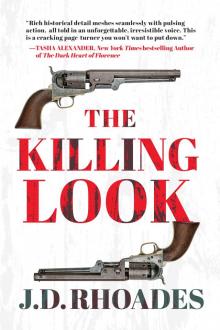 The Killing Look
The Killing Look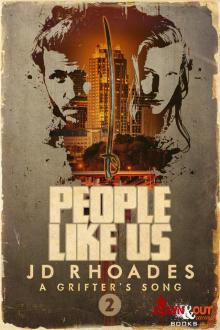 People Like Us
People Like Us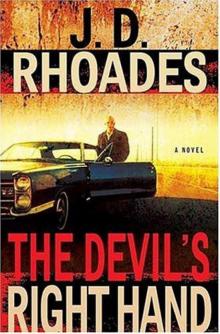 Jack Keller - 01 - The Devil's Right Hand
Jack Keller - 01 - The Devil's Right Hand Safe and Sound
Safe and Sound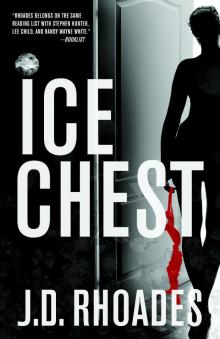 Ice Chest
Ice Chest Breaking Cover
Breaking Cover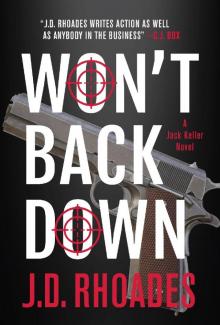 Won't Back Down
Won't Back Down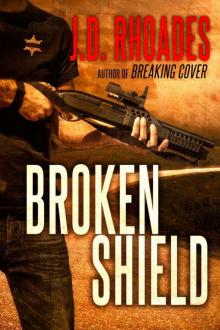 Tony Wolf/Tim Buckthorn - 02 - Broken Shield
Tony Wolf/Tim Buckthorn - 02 - Broken Shield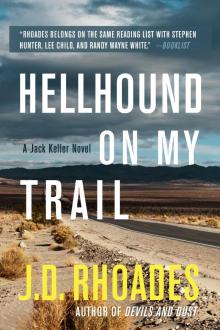 Hellhound On My Trail
Hellhound On My Trail Breaking Cover (Tony Wolf/Tim Buckthorn)
Breaking Cover (Tony Wolf/Tim Buckthorn)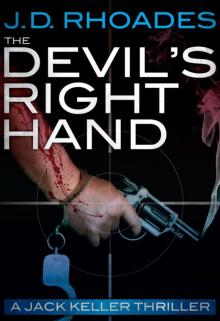 The Devil's Right Hand
The Devil's Right Hand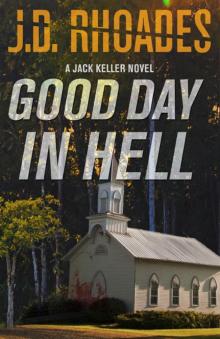 Good Day In Hell
Good Day In Hell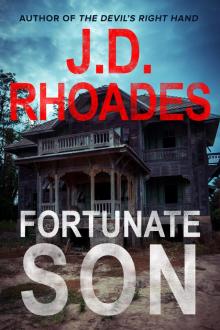 Fortunate Son
Fortunate Son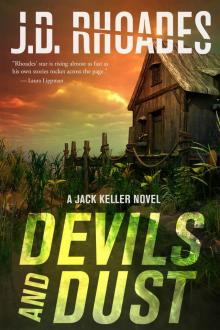 Devils and Dust
Devils and Dust